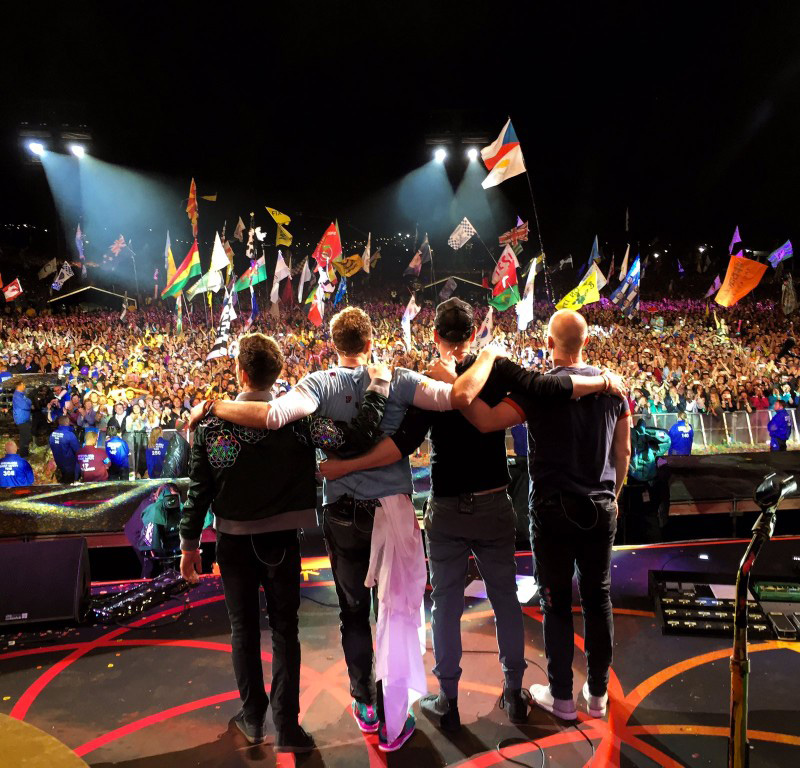NEWS / ARTICLES 11th January 2019
Want Your Employees To Bring Themselves To Work? Start By Bringing In Music
It’s a balmy Friday evening in Sydney, Australia and global superstar Adele takes to the stage at ANZ Stadium. She’s won nine BRIT awards, earned fifteen Grammys and is about to entertain 80,000 people in a world-class arena. In spite of these formidable achievements, Adele doesn’t wear the haughty pout or dark tinted shades of an A-list celeb. Instead, she lets out a cackling laugh as she warns her audience to watch out for an accidental burp during the key change in Don’t You Remember before almost stacking it down the stage stairs. Clumsy, slightly uncouth and unapologetically honest, it can’t be denied that Adele brings her full self to work every day. Her fans’ adoration of her authenticity is reflected in her twenty-eight million followers on Twitter and a stellar career still going strong.

Business author Mike Robbins defines bringing ourselves to work as turning up to the office as “who we are…fully and authentically”. By allowing ourselves to be “vulnerable, imperfect human beings”, he argues we can shed our “work persona”, unlock our creativity and build stronger relationships with others. International research into the positive effects of employee authenticity is yielding promising results; from Canada to Holland, being ourselves at work is resulting in higher job satisfaction, lower job stress, increased engagement and improved performance.
However, we can’t expect our employees to just leap into the office one morning and break out into a rousing chorus of This Is Me. One study revealed that a shocking 61% of employees “cover up” who they are at work. Our companies need to encourage and nurture authenticity from day one, and we need the right tools to do it. Excitingly, scientific evidence and psychological studies are revealing that a verse or two from The Greatest Showman may in fact be the very thing we need. Here’s how music can help us be more ourselves at work.
Music Shows Us It’s OK To Make Mistakes
At Glastonbury 2016, Coldplay’s frontman Chris Martin halted a performance of their song Everglow having realised that the band were playing in completely different musical keys. After a casual conversation with his bandmates in front of a 150,000-strong audience, Chris decided to perform the number solo. The band’s technical blunder was forgotten as the genuine spontaneity of Chris’ performance connected with billions of people. Filling newspaper headlines the next day, the mistake became the highlight of the show.

According to authentic leadership expert Henna Inam, many of us “hold back a big part of what makes us human and vulnerable in order to be seen as professional, competent and successful”. Worryingly, this attitude weakens our performance. Psychological studies have revealed that participants pressured to prove they are good at a problem-solving task perform far more poorly than participants who are allowed to use the task as a learning exercise.
Musicians are experts at making mistakes. During rehearsals and even performances, mistakes are not only inevitable but fundamental to improvement. In the words of legendary jazz musician Thelonious Monk “there are no wrong notes; some are just more right than others”. What’s more, research has demonstrated the benefits of musicians’ openness to mistakes. According to the University of St Andrews, both amateur and professional musicians are significantly better at identifying mistakes and correcting them than non-musicians. From the pyramid stage to a lunch hour jam, music encourages us to ditch the persona of perfection. In doing so, we learn more, stay motivated and perform better.
Music Allows Us To Express Ourselves
How many of us secretly wear our Rolling Stones t-shirts under our crisp shirts and monochrome ties? Is it just you who purses your lips tightly to refrain from belting the chorus of Don’t You Want Me as it blares out of the radio? Music is a huge part of who we are, yet singing our favourite song with full gusto is rarely deemed acceptable (unless we’ve consumed several glasses of mulled wine at the Christmas do).
However, there’s plenty of evidence to show that music-making at the office should be more than an annual occurrence if we want to encourage employees to be themselves. Self-report studies have shown that playing a musical instrument contributes to high self-esteem, self-confidence and a strong sense of identity in orchestral musicians and students. Singing or playing music even triggers the release of a neurotransmitter called dopamine which, apart from giving us a burst of pleasure, increases feelings of confidence. In the words of multi-platinum artist Josh Groban, “music can help you open up a part of yourself”. We might not be swinging a hula hoop round our hips Grace Jones style, but playing music can help us to reveal more of the colour in our personalities.
Music Can Help Us To Make More Genuine Connections With Others
When we find out that Janice from accounting was also at Queen’s legendary Live Aid performance in ’85, or that Ian from HR likes The Stone Roses as much as we do, we feel closer to them. International research has shown that we rate others more highly when we discover they have similar music tastes to us. When we want to get to know our colleagues better but don’t know where to start, music provides a positive way to transcend professional barriers and make more personal connections. Forget cracking open an after-work bottle of Merlot- music, as Robert Fripp famously said, is the wine that fills the cup of silence.
Want to bring music into your workplace? Contact rachel@ingoodtime.com to find out more about our music team building services.
Written by J. Harvey